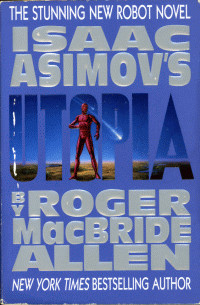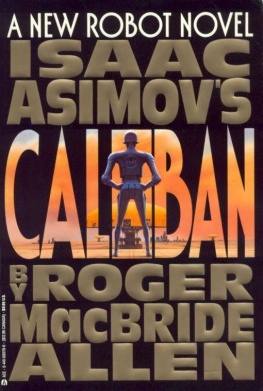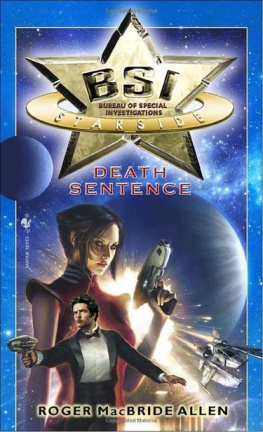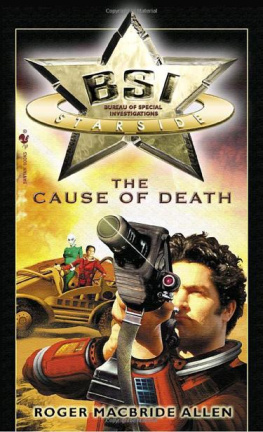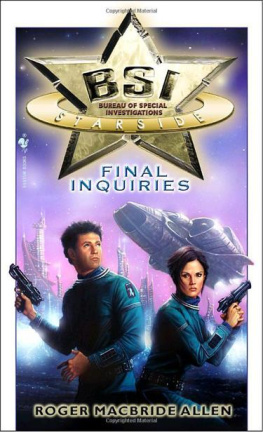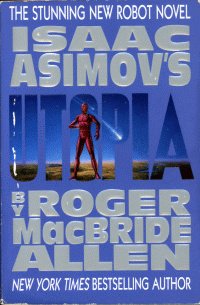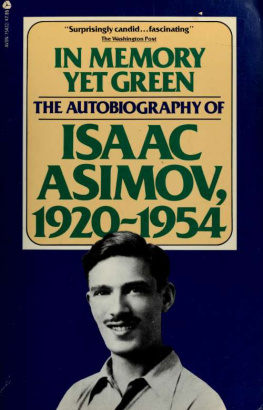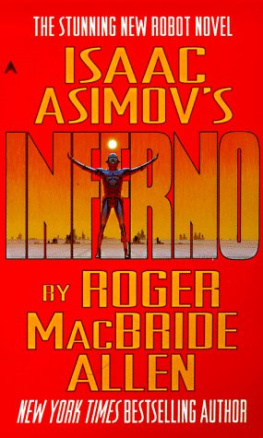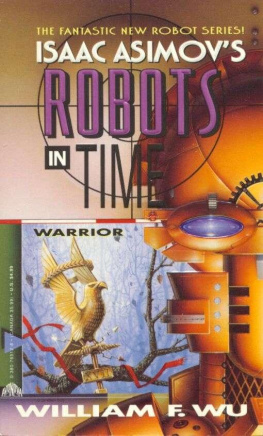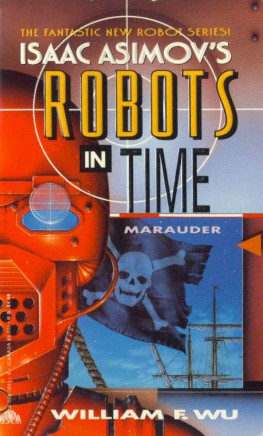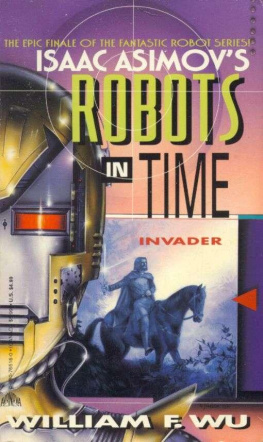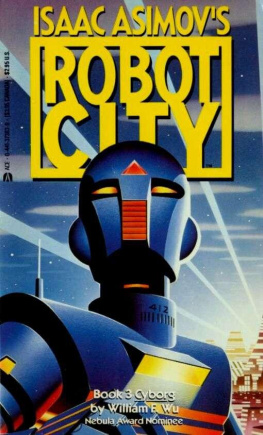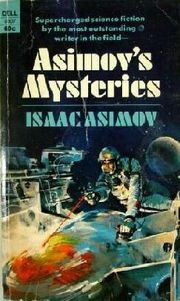Isaac Asimov, Roger MacBride Allen
Utopia
CALIBAN
The First Law states:
The Caliban Trilogy is a searing examination of Asimovs Three Laws of Robotics, a challenge welcomed and sanctioned by Isaac Asimov, the late beloved genius of science fiction, and written with his cooperation by one of todays hottest talents, Roger MacBride Allen, New York Times bestselling author of Star Wars: Ambush at Corella.
A robot may not injure a human being, or, through inaction, allow a human being to come to harm.
INFERNO
The Second Law states:
A robot must obey the orders given it by human beings except where such orders would conflict with the First Law.
UTOPIA
The Third Law states:
A robot must protect its own existence as long as such protection does not conflict with the First or Second Law.
To My Brother Chris,
His Wife Edie,
My Sister Connie,
And Her Husband Jim.
Authors Note
I would like to thank all the people involved with this book, and with this trilogy. It has been a long and complicated undertaking. Now, at long last, it is complete.
These three books would have been absolutely impossible if not for the prodigious literary output of the late Isaac Asimov, and if not for the prodigious popularity of his work. He is and will be greatly missed, and we are all in his debt. It has been an honor and a privilege to explore the ideas and the worlds he created.
Thanks as well to the editors who have labored over Caliban, Inferno, and Utopia. David Harris, John Betancourt, Leigh Grossman, and Keith R. A. DeCandido all worked to improve these books-and all succeeded. Thanks also to Susan Allison, Ginjer Buchanan, and Laura Anne Oilman of Ace Books, to Peter Heck, and to Byron Preiss, for their labors on my behalf.
And, of course, thanks as well to Eleanore Maury Fox. I hadnt even met her when I started work on this trilogy. Now she is my wife. This is the spot where authors usually talk about the love, affection, and patience of their long-suffering spouses, and Eleanore certainly deserves thanks on all those counts. But I also got something else: very hard-edged, straightforward, professional editorial advice. It helped a lot.
I now come to my sister Constance Witte, my brother Chris Allen, my brother-in-law Jim Witte, and my sister-in-law Edith Allen. This last book of the trilogy is dedicated to them, as the first one was dedicated to their children. (Except for one, and Ill come to her in a minute.) Connie, Chris, Jim and Edie: thank you, for a list of things that would be longer than this book. Thanks as well to my parents, Tom and Scot tie Allen, and to my mother-in-law Elizabeth Maury, to my father-in-law David Fox, and to my brother-in-law, Carl Fox. The family just keeps getting bigger, and consequently I just keep getting luckier.
Speaking of families getting bigger, the newest member of it hadnt quite arrived when I dedicated Caliban to my nieces and nephews. She deserves to be on the list. In closing, therefore, I would like amend that dedication to include Anna Patrice Allen. Welcome aboard, Anna.
Roger MacBride Allen
Brasilia. Brazil
November, 1995
The new laws of robotics
I. A Robot May Not Injure A Human Being.
II. A Robot Must Cooperate with Human Beings Except Where Such Cooperation Would Conflict with the First Law.
III. A Robot Must Protect Its Own Existence, As Long As Such Protection Does Not Conflict with the First Law.
IV. A Robot May Do Anything It Likes, Except Where Such Action Would Violate the First, Second, or Third Laws.
The original laws of robotics
I. A Robot May Not Injure a Human Being, or, Through Inaction, Allow a Human Being to Come to Harm.
II. A Robot Must Obey the Orders Given It By Human Beings Except Where Such Orders Would Conflict With the First Law.
III. A Robot Must Protect Its Own Existence As Long As Such Protection Does Not Interfere With the First or Second Law.
THE SPACER-SETTLER STRUGGLE was at its beginning, and at its end, an ideological contest. Indeed, to take a page from primitive studies, it might more accurately be termed a theological battle, for both sides clung to their positions more out of faith, fear, and tradition, rather than through any carefully reasoned marshaling of the facts.
Always, whether acknowledged or not, there was one issue at the center of every confrontation between the two sides: robots. One side regarded them as the ultimate good, while the other saw them as the ultimate evil. Spacers were the descendants of men and women who had fled semi-mythical Earth with their robots when robots were banned there. Exiled from Earth, they traveled in crude starships on the first wave of colonization from earth. With the aid of their robots, the Spacers terraformed fifty worlds and created a culture of great beauty and refinement, where all unpleasant tasks were left to the robots. Ultimately, virtually all work was left to the robots. Having colonized fifty planets, the Spacers called a halt, and set themselves no other task than enjoying the fruits of their robots labor.
The Settlers were the descendants of those who stayed behind on Earth. Their ancestors lived in great underground Cities, built to be safe from atomic attack. It is beyond doubt that this way of life induced a certain xenophobia into Settler culture. That xenophobia long survived the threat of atomic war, and came to be directed against the smug Spacers-and their robots.
It was fear that caused Earth to cast out robots in the first place. Part of it was an irrational fear of metal monsters wandering the landscape. However, the people of Earth had more reasonable fears as well. They worried that robots would take jobs-and the means of making a living-from humans. Most seriously, they looked to what they saw as the indolence, the lethargy, and the decadence of Spacer society. The Settlers feared that robots would relieve humanity of its spirit, its will, its ambition even as they relieved humanity of its burdens.
The Spacers, meanwhile, had grown disdainful of the people they perceived to be grubby underground dwellers. Spacers came to deny their own common ancestry with the people who had cast them out. But so too did they lose their ambition. Their technology, their culture, their worldview, were all static, if not stagnant. The Spacer ideal seemed to be a universe where nothing ever happened, where yesterday and tomorrow were like today, and the robots took care of all the unpleasant details.
The Settlers set out to colonize the galaxy in earnest, terraforming endless worlds, leapfrogging past the Spacer worlds and Spacer technology. The Settlers carried with them the traditional viewpoints of the home world. Every encounter with the Spacers seemed to confirm the Settlers reasons for distrusting robots. Fear and hatred of robots became one of the foundations of Settler policy and philosophy. Robot-hatred, coupled with the arrogant Spacer style, did little to endear Settler to Spacer.
But still, sometimes, somehow, the two sides managed to cooperate, however great the degree of friction and suspicion. People of good will on both sides attempted to cast aside fear and hatred to work together-with varying success.
It was on Inferno, one of the smallest, weakest, most fragile of the Spacer worlds, that Spacer and Settler made one of the boldest attempts to work together. The people of that world, who called themselves Infernals, found themselves facing two crises. Their ecological difficulties all knew about, though few understood their severity. Settler experts in terraforming were called in to deal with that.
Next page
